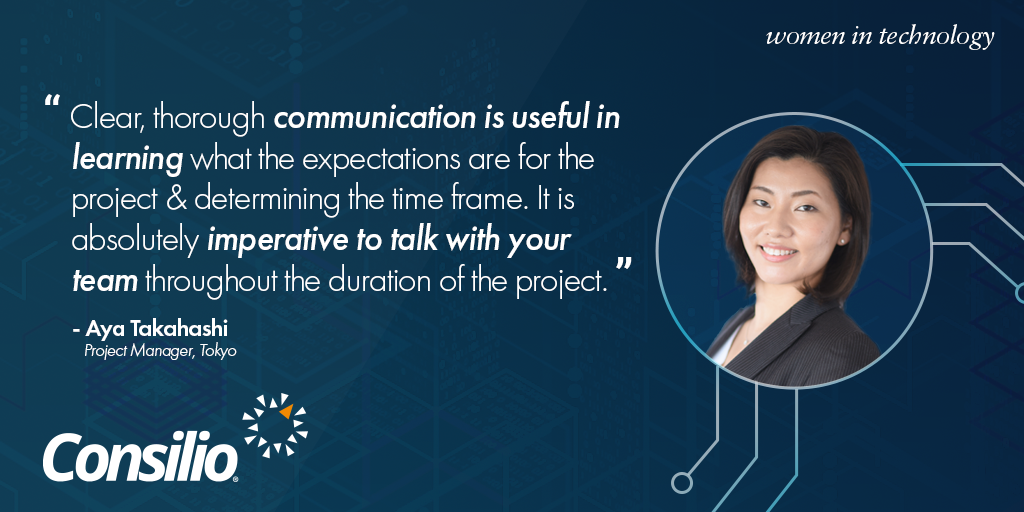 This blog is part of our on-going Women in Technology series.
This blog is part of our on-going Women in Technology series.
Aya Takahashi is a Project Manager with Consilio based in Tokyo. Aya has about ten years of experience in the industry, five of those with Consilio. To Aya, the best part of working at Consilio is being a part of the expert team for APAC that handles specialized requests from Japanese clients and global team members for a variety of matters.
How did you get into the eDiscovery industry?
After I graduated, I lived in Australia for one year while focusing on surfing, and later returned to Tokyo. While I was job searching, I met an Australian woman working at an eDiscovery company in Tokyo. She mentioned that the company was looking for an administrative assistant who could speak English and Japanese, and I was like, “I can do that.”
Right after I joined the industry, in March 2011, the Tohoku-Pacific Ocean Earthquake and tsunami happened. The earthquake shook Tokyo while I was copying data at the data center. I still remember that hundreds of server cages were shaking with loud sounds while buildings and trees were swinging outside of the windows. This earthquake forced many foreigners who were working in Japan to return to their home countries without much exception. During this time, I was able to transition into the PM role that I am in today.
Have you noticed gender playing an apparent role during your career?
In global places or occasions, like a large company or meeting with a variety of attendees, the environment is truly modern. Men and women in the office are held to the same high standards and everyone works well together. However, in a typical company, regardless of the size, it is sometimes expected for women to behave in a certain way. Sometimes, even at large global companies, I have seen the respect for other genders lost in teams with fewer members, but with broader age ranges and experience gaps.
What is your advice for women that are working in male-dominated settings?
I don’t have one specific piece of advice here but I think it is important for women to be honest with ourselves. We should be able to learn how to work in multiple settings.
What do you feel like companies do order to motivate more women to pursue careers in technology?
I think companies can encourage more women to pursue careers in technology by promoting a good work-life balance. With more scheduling flexibility and adaptability, employees with families will definitely feel more accommodated in the workplace. In addition to that, I think it will be a good idea if corporations focused on promoting health and wellness for women in the workplace! Also if some woman employee can share how work-life balance changed after the life events, that would be very beneficial to consider about one’s own future career.
What are your techniques for managing tight time frames and competing priorities?
Time management and prioritization are essential to me as I am assigned to both local Japanese matters and cross-border matters. In many cases, there is uncertainty around the time frame of when requests will come in – it could be in the morning or the middle of the night, even. Clear, thorough communication is useful in learning what the expectations are for the project and determining the time frame. It is absolutely imperative to talk with your team throughout the duration of the project.
When you are not working, how do you spend your free time?
I like to spend my free time outside, walking around my city. I also really enjoy doing sports and spending time with my dogs.